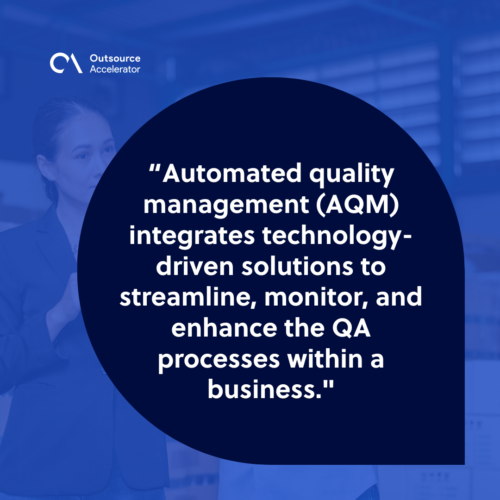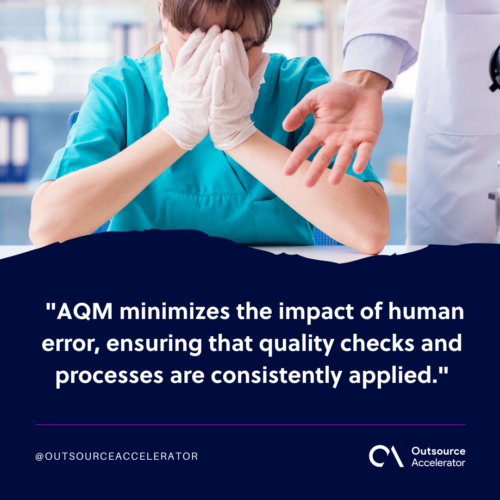What is automated quality management (AQM)?

Quality assurance (QA) is critical to contact center operations, ensuring customer interactions meet established standards.
In the past, quality management (QM) was primarily a manual process, requiring significant time and effort. However, with the advent of technology, automated quality management (AQM) has emerged as a game-changer for call centers.
Observe.AI reported many contact centers are already using AI technology. It noted that QA automation (41%) is among the most common applications in enhancing QM processes.
So, AQM is not just about leveraging technology — it’s a strategic move to enhance efficiency, accuracy, and operational excellence.
In this guide, we’ll explore the concept of AQM and its benefits. We’ll also discuss important considerations when selecting AQM solutions and provide insights on implementing them.
Defining automated quality management (AQM)
Automated quality management (AQM) integrates technology-driven solutions to streamline, monitor, and enhance the quality management process within a business.
It leverages various software and AI capabilities to automate the evaluation of recorded calls and customer interactions.
AQM employs advanced algorithms and speech analytics to evaluate these interactions for adherence to predefined quality metrics automatically.
Speech analytics technology identifies key conversation elements, such as:
- Compliance with script guidelines
- Customer satisfaction
- Agent tone
- Resolution of customer issues
Automated quality management improves efficiency, accuracy, and consistency in QA procedures, freeing up valuable time for call center agents and supervisors.

Manual vs. Automated quality management
In the not-so-distant past, quality management relied heavily on manual processes. Human intervention was paramount for inspections, audits, and data analysis.
While effective to a certain extent, manual quality management is inherently prone to errors, subjectivity, and limited scalability.
Enter AQM, a revolutionary advancement in the field of quality management. Automation eradicates the limitations of manual processes. It provides a more accurate, scalable, and objective approach to maintaining and improving quality standards.
Manual QM is randomized and can only monitor 2% of calls. But with AQM solutions, a contact center can evaluate 100% of its interactions.
Consider this: Identifying and rectifying deviations in a manual quality management scenario could take days.
Automated quality management expedites this process, often in real-time. It also prevents potential bottlenecks and ensures swift corrective action.
Benefits of automated quality management
The adoption of automated quality management solutions yields numerous benefits. It can catapult businesses into a realm of heightened efficiency and operation through:
Better agent performance
AQM provides agents with actionable insights based on data-driven evaluations.
Supervisors can provide targeted coaching and training by identifying agent strengths and areas for improvement.
Automating routine and repetitive QM tasks also allows employees to focus on more strategic and value-added activities.
Embracing customer feedback empowers agents to adapt, enhancing performance and ensuring exceptional service delivery aligned with client expectations.
As a result, agents’ performances are improved, leading to better customer satisfaction.
Improved compliance
Automated quality management can effectively monitor compliance with regulatory guidelines, industry standards, and organizational policies.
Call centers can proactively address potential compliance issues and mitigate risks by flagging potential compliance issues.
Alvaria highlights this benefit, saying modern technology empowers call centers to balance intelligent compliance while boosting customer experience and operational efficiency.
Enhanced customer experience
Automated evaluations help identify patterned customer concerns, sentiment analysis, and common pain points.
This information allows call centers to develop strategies to:
- Enhance customer interactions
- Resolve issues promptly
- Deliver a more personalized experience
Implementing an automated quality management system can greatly improve customer experience by allowing businesses to monitor and analyze customer interactions continuously.
This helps businesses to pinpoint areas that need improvement in their customer service quality.
Cost savings
While the initial investment in AQM technology might seem significant, the long-term cost savings are substantial.
Automation reduces the need for manual quality management processes, leading to significant savings. It does so by:
- Lessening the need for extensive manual labor
- Decreasing the likelihood of errors leading to costly defects
- Optimizing resources for maximum efficiency
Real-time insights
One of the standout features of AQM is its ability to provide real-time insights into quality metrics. This empowers businesses to find and address issues ASAP.
It helps prevent the escalation of problems that could impact overall operations.
This proactive approach allows for immediate course correction and ensures consistent service quality.
Accountability and transparency
Automated quality management provides a transparent evaluation process. It allows agents to:
- Track their progress
- Understand evaluation criteria
- Take personal accountability for their performance
Accuracy and consistency
AQM minimizes the impact of human error, ensuring that quality checks and processes are consistently applied.
This results in higher accuracy in identifying deviations and maintaining uniform quality standards, such as ISO.

Considerations for automated quality management solutions
As with any transformative technology, implementing AQM requires careful consideration.
Here are some factors to ensure seamless integration and maximize its potential:
Speech analytics capabilities
Look for solutions that offer advanced speech analytics features, such as sentiment analysis, keyword detection, and grammar accuracy.
These capabilities enable accurate evaluations and uncover crucial insights from customer interactions.
Meeting customer expectations should be at the forefront of any quality management strategy, ensuring that the solutions implemented enhance customer satisfaction and loyalty.
Integration with existing systems
Ensure the automated quality management solution integrates seamlessly with other call center systems. These systems could include:
- Customer relationship management (CRM) software
- Workforce management tools
- Call recording platforms
Smooth integration enhances data sharing and provides a holistic view of agent performance.
User-friendly interface
While the technology behind AQM is complex, its interface should be user-friendly.
The goal is to empower users across different levels of technical expertise to navigate and use the system without extensive training.
Customizable evaluation criteria
Each call center has unique requirements and evaluation criteria. Opt for a flexible AQM solution that allows customizable evaluation forms and metrics.
This ensures alignment with organizational goals and quality assurance standards.
Real-time monitoring and alerts
Real-time monitoring capabilities let supervisors take immediate action on quality issues.
Look for solutions that provide alerts and notifications for specific events, such as instances of non-compliance or customer dissatisfaction.
Scalability
Consider the ability of automated quality management to scale alongside call center growth.
As call volumes increase, the solution should accommodate higher evaluation loads and provide consistent performance.
Data security and compliance
Given the sensitive nature of quality data, robust security measures must be in place.
AQM solutions should comply with industry regulations and standards, safeguarding data integrity and confidentiality.
How to implement automated quality management
Implementing automated quality management systems involves careful planning, execution, and ongoing optimization.
Here’s a roadmap to guide businesses through the process:
1. Assess current processes
Begin by conducting a thorough assessment of existing quality management processes. Identify pain points, areas of improvement, and the specific quality metrics that matter most to the business.
2. Define clear objectives
Clearly outline the objectives of implementing automated quality management.
Whether it’s improving accuracy, reducing defects, or enhancing overall efficiency, having well-defined goals will guide the selection and customization of the AQM solution.
3. Evaluate and choose the right AQM solution
Selecting an AQM solution is a critical decision. Consider the factors we’ve mentioned before to make the most of this process.
Consult with vendors, request demos, and ensure the chosen solution aligns with the business’s unique needs.
4. Data preparation
Consolidate and organize call recordings, customer data, and other relevant information.
Ensure compliance with data privacy regulations and optimize data for accuracy and accessibility.
5. Pilot implementation
Before a full-scale rollout, conduct a pilot implementation in a controlled environment. This allows for:
- Real-world testing
- Identification of potential challenges
- Fine-tuning of the automated quality management solution for optimal performance
6. Training and adoption
Automated quality management is only as effective as the users operating it.
Provide comprehensive training to supervisors, QA teams, and agents, emphasizing the AQM solution’s functionality and benefits.
Encourage adoption and transparency in utilizing the automated evaluation process.
7. Continuous monitoring and optimization
Once implemented, AQM requires continuous monitoring and optimization.
Regularly assess its performance, gather user feedback, and adjust as needed to address changing business requirements.
The future of AQM solutions
As technology continues to evolve, so does the landscape of AQM solutions. The future holds exciting possibilities, driven by advancements in AI, machine learning (ML), and the Internet of Things (IoT).
1. AI-driven predictive analytics. Integrating AI in AQM enables predictive analytics, which allows businesses to anticipate and prevent quality issues before they occur.
2. IoT-enabled quality monitoring. With the proliferation of IoT devices, AQM can leverage real-time data from connected devices for comprehensive quality monitoring.
This enhances accuracy and provides a holistic view of quality across the entire value chain.
3. Continuous improvement through ML. Machine learning algorithms embedded in AQM solutions can adapt and learn from data patterns over time.
This ensures the system becomes more efficient and effective with each use.
4. Cloud-based automated quality management platforms. The shift towards cloud-based solutions is inevitable. Cloud-based AQM platforms offer increased flexibility, accessibility, and scalability.
5. Integration with Industry 4.0. As businesses embrace Industry 4.0 principles, AQM solutions will be pivotal in integrating quality management into smart, connected manufacturing processes.

Automated quality management is not just a technological upgrade — it’s a tactical move for businesses seeking to stay ahead in a competitive landscape.
The benefits of enhanced accuracy, real-time monitoring, scalability, cost savings, and improved productivity make AQM a cornerstone of modern quality management.
By carefully considering implementation factors, businesses can unlock the full potential of AQM.
It can help set the stage for a future where quality is not just a standard but a dynamic and adaptive force driving operational excellence.
Looking into the future of AQM solutions, it is evident that these technologies will play a crucial role in enhancing the whole quality management process for businesses across various industries.







 Independent
Independent




